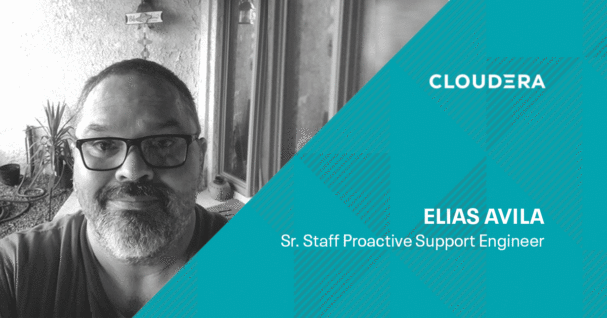As we wrap up Hispanic Heritage month this #ClouderaLife Spotlight features Elias Avila, senior staff proactive support engineer for Cloudera. In this spotlight, we talk about his career in technology and his philosophy for getting the most out of work in terms of satisfaction and advancement. We also talk about his upbringing in the primarily Mexican American community of Salinas, California, and the important role Hispanics play in California’s Central Valley.
Working in Cloudera’s support organization
Elias Avila is a senior staff proactive support engineer who works directly with Cloudera’s customers. Instead of strictly addressing open support cases, which is a more traditional support role, he works with customers to look at the system trends specific to their product installation, and teaches them how to proactively analyze and validate their system for optimal use. “Cloudera has some fantastic products, like the Cloudera Manager, that really streamlines the installation process,” Elias said, as he went on to explain with excitement the various tools and processes he uses.
“I’ve had some fantastic managers at Cloudera who have helped me with my career,” Elias said, as he observed working at Cloudera as striking a healthy work/life balance while providing opportunities for growth. Elias has been with the company for nine years; he came to Cloudera from IBM where he was a support engineer and prior to that a software developer.
I liked being a developer, but the work focuses on solving a specific problem. I like support work even more as I get a sense of the big picture and get to work collaboratively with the customer,” he said. “It’s very satisfying to work through and solve their challenges.
His start at Cloudera: how breaking your own “records for closed support cases” can translate to greater job satisfaction.
About four years ago Elias transitioned into a proactive support engineer role and stopped taking traditional support cases. He holds the company record for the most cases closed! “When I first started at Cloudera I really looked up to my new colleagues,” Elias said. “I could see they were talented, while I felt pretty green in comparison. So I made a goal for myself to take and close more cases than anyone on my team.” And he did!
What was Elias’ secret that kept him so motivated? A work ethic that he has followed most of his life: try to be the best at whatever you do. “What I used to tell my kids was that the key to being happy at your job is less about what you are doing and more about how you conduct yourself day to day,” Elias said. “Your job could pay minimum wage or be entry level or senior level. In any instance, strive to be better than anyone else and you will be satisfied at your job.”
A lot of this includes always thinking proactively. “If you are watching the clock all day that is not a good place to be,” he explained. “Starting with the work you’re assigned is the priority, but observe, ask questions, and speak up where you think things should be improved.” This thinking has led to Elias creating ways to speed up the support process at Cloudera, like writing software scripts that automate previously manual processes.
While this perspective has given Elias greater job satisfaction over the years, it also has the positive side effect of making one stand out at work, opening up new opportunities for advancement.
Early beginnings: an Hispanic heritage that shaped Elias and literally fed the world
Elias grew up in the east side of Salinas, California, home to a large Mexican American and newly arrived Mexican immigrant community, many of which found work in the enormous agricultural center of California’s Central Valley. Despite growing up in a low-income household, Elias witnessed the unrelenting work ethic of his mother, who worked backbreaking hours in the fields. “She worked hard and was very proud,” Elias said as he went on to talk about how she was part of the worker’s movement led by Cesar Chavez who won important victories to raise pay and improve working conditions for farm workers in the late 1960s, 70s and 80s.
In Salinas there were not a lot of opportunities. During high school, he played on the football team, where he learned about teamwork, discipline, and persistence. “I played football during the season, and then track and field and wrestling during the off season to always be involved in organized sports,” Elias said.
Elias credits school sports as one of his keys to escaping the cycle of poverty he saw around him. “While other kids were out getting into trouble, I was either at school, work, or team practice,” Elias said. “Over time, my social circle was like-minded teammates that had a common goal and kept me on the right track.” Elias recalled one high school friend that came from a well-to-do family in comparison and had many opportunities handed to him. Elias didn’t have that luxury and knew if he didn’t lift himself up, no one would.
After high school, Elias moved to Arizona to stay with family and to find work. He also continued football with a semi-pro league for three seasons. He eventually got married and started his own family. This became extra motivation for a better life, not just for himself, but now for his growing family.
He enrolled in community college and eventually transferred to the University of Arizona while working full time at a power supply company in shipping and receiving. There, he worked with some electrical engineers and thought that profession would be a good career path. “I remember not everyone was encouraging,” Elias said. “I heard things like, ‘Engineering is a lot of math, you may spend all that money for school and not make it through.’ Instead of discouraging me, this became a source of motivation.”
During his first year in school, he took a required computer programming course. He had barely used a computer prior but was blown away by the power to create programs and the possibilities therein. He fell in love with this area of study and even started to write programs that helped his kids with their homework.
After that first class he promptly changed his major from electrical engineering (still keeping it as a minor) to computer engineering. Since money was tight back then he couldn’t afford to upgrade to the latest and greatest home computers, so he taught himself how to replace individual components. He began to be fully versed in both computer software and hardware, launching a new career for himself.
“Through all of this, I think back to when I was 17 and would work in the fields of Salinas during the summer,” Elias explained. “It was backbreaking work even at that age, and I think it’s important to recognize the contribution made by Hispanics that work these fields every day.” Taken in its entirety, the Central Valley supplies the United States with one quarter of the nation’s food, including 40% of the nation’s fruits, nuts, and other table foods*. The area also accounts for over 14% of all US food exports*.
As we wrapped up the discussion, Elias described the garage workshop where he creates goods out of wood and metal for family and friends in his spare time. Always wanting to learn more, he has become a self-taught welder and machinist and has built or modified many of his workshop tools. “I get more satisfaction out of using tools I create,” he said. “I guess I like figuring out better ways to do things in and out of work.”
In closing, we want to thank Elias for telling his story and for his proactive work at Cloudera and beyond.
We look forward to hearing about the next step in your journey.
Interested in working with others like Elias? Check out our current job openings




